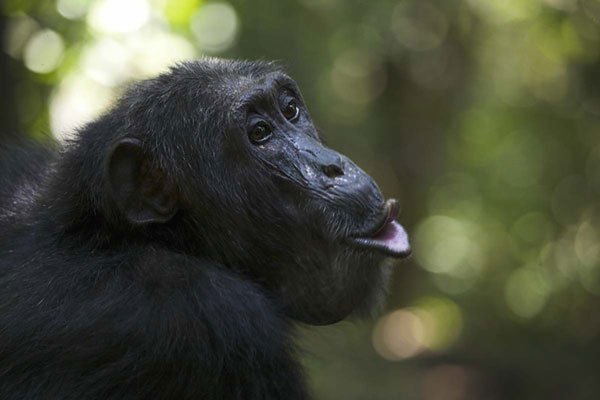Human Evolution: Our Closest Living Relatives, the Chimps

Editor's Note: This is Part 5 in 10-part series LiveScience series on the origin, evolution and future of the human species and the mysteries that remain to be solved.
As scientists try and solve and mystery of how we originated, an invaluable source of clues is the chimpanzee.
Of course, humanity did not evolve from the chimpanzee, which has spent time evolving on its own path for millions of years from our last common ancestor, just as we have. Still, chimps are our closest living relatives — we share 98.8 percent of their DNA — and new research is continuing to shed light on just how similar we remain, promising to yield insights into the roots we both stem from.
Close but not too close
Genetic evidence suggests the ancestors of humans and chimpanzees diverged roughly 4 million years ago. The relative size of the chimp brain matches most of our extinct relatives, for a long time suggesting our ape cousin might be an ideal place to glimpse humanity's origins.
New evidence suggests, however, that our last common ancestor may not have looked as chimp-like as before thought. The fossil Ardipithecus ramidus, dating 4.4 million years old, which may very well be ancestral to both human and chimpanzee lineages, walked neither like us or chimps, possessing instead an intermediate form of walking.
In addition, Ardipithecus seemed to have possessed canines that are reduced in size, while male chimps have large tusk-like canines used as weapons for threatening and sometimes attacking other males. This may suggest that chimpanzees behaved significantly differently from our last common ancestor.
Sign up for the Live Science daily newsletter now
Get the world’s most fascinating discoveries delivered straight to your inbox.
Still close enough
Nevertheless, humans keep much in common with chimpanzees.
"Emotionally and socially, the psychology of chimps is very similar to humans," said primatologist Frans de Waal at Emory University in Atlanta.
For instance, he noted, chimps have shown they can help unrelated chimps and human strangers at personal cost without apparent expectation of personal gain, a level of selfless behavior often claimed as unique to humans. They also display what many scientists dub culture, with groups of chimpanzees socially passing on dozens of behaviors such as tool kits from generation to generation that are distinct from ones seen in other groups.
"The big difference I see going for us is language," de Waal said. "They can learn a few symbols in labs, but it's not impressive in my opinion compared to what even a young child can do. They don't really symbolize like we do, and language is a big difference that influences everything else that you do — how you communicate, basic social interactions, all these become far more complex."
Make love, not war?
As gentle as our closest living relatives can be, chimps also can be quite violent in the wild, raping, killing and warring against their rivals. "They don't like cooperating with strangers, that's for sure," de Waal said.
Harvard biological anthropologist Richard Wrangham has suggested this pattern of violence may have been part of humanity's legacy as well for millions of years. However, de Waal noted that based what the canines of Ardipithecus suggest, "chimpanzees may be specialized in that regard. It's only with the special recent human conditions of settlement and agriculture that gave us the incentive to worry about wealth, leading us to become warriors that way."
Instead, de Waal suggests looking at our other close relative, the bonobos, the chimpanzee-like great apes once dubbed "pygmy chimpanzees" that are more playful, often resolving conflicts with sex instead of violence. "Other scientists have speculated that bonobos may be the more ancestral type," he said.
Father figures
In the case of either chimpanzees or bonobos, humans are distinct in that fathers are often involved in child care. "Gorilla males protect the females and offspring, but that's pretty much it," de Waal said.
"That's what's very special about human society — the males are involved in caring for offspring," he added. "It's possible this is because we moved from the forests, where if a predator comes along, you can just climb a tree. There's more danger to deal with when we came down from the trees, and so that might have been the trigger for males to get involved."
- Top 10 Things That Make Humans Special
- Top 10 Mysteries of the First Humans
- Poll: Your View of Human Evolution











